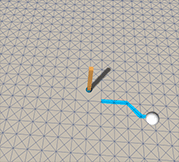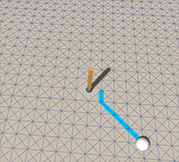Class ABPath Extends Path
Basic path, finds the shortest path from A to B.
This is the most basic path object it will try to find the shortest path between two points.
Many other path types inherit from this type.
Public Methods
Default constructor.
Called for every node that the path visits.
Public Static Methods
Construct a path with a start and end point.
Creates a fake path.
Public Variables
Calculate partial path if the target node cannot be reached.
Total cost of this path as used by the pathfinding algorithm.
End node of the path.
End point of the path.
True if this path type has a well defined end point, even before calculation starts.
Optional ending condition for the path.
End Point exactly as in the path request.
Start Point exactly as in the path request.
Start node of the path.
Start point of the path.
Inherited Public Members
Blocks until this path has been calculated and returned.
Returns if the node can be traversed.
Returns if the path can traverse a link between from and to and if to can be traversed itself.
Increase the reference count on this path by 1 (for pooling).
Current state of the path.
Aborts the path because of an error.
Returns penalty for the given tag.
Total Length of the path.
Returns the cost of traversing the given node.
True if this path is done calculating.
Opens a connection between two nodes during the A* search.
Burst-compiled internal implementation of OpenCandidateConnection.
Open a connection to the temporary end node if necessary.
Returns the state of the path in the pathfinding pipeline.
Reduces the reference count on the path by 1 (pooling).
True if this path node might be worth exploring.
Paths use this to skip adding nodes to the search heap.
Copies the given settings into this path.
Waits until this path has been calculated and returned.
Callback to call when the path is complete.
How long it took to calculate this path in milliseconds.
Which graph tags are traversable.
If the path failed, this is true.
Additional info on why a path failed.
Determines which heuristic to use.
Scale of the heuristic values.
Immediate callback to call when the path is complete.
Constraint for how to search for nodes.
ID of this path.
Number of nodes this path has searched.
Penalties for each tag.
Provides additional traversal information to a path request.
Holds the (possibly post-processed) path as a Vector3 list.
Private/Protected Members
Helper method to add endpoints around a specific unwalkable grid node.
Calculates the path until completed or until the time has passed targetTick.
Always called after the path has been calculated.
Returns a debug string for this path.
Writes text shared for all overrides of DebugString to the string builder.
Writes text shared for all overrides of DebugString to the string builder.
Applies a special case for grid nodes.
Closest point and node which is traversable by this path.
Called when the path enters the pool.
Called when a valid node has been found for the end of the path.
Called when there are no more nodes to search.
Prepares the path.
Prepares low level path variables for calculation.
Reset all values to their default values.
Calls callback to return the calculated path.
Traces the calculated path from the end node to the start.
Sets the start and end points.
List of zeroes to use as default tag penalties.
Target to use for H score calculation.
True if the Reset function has been called.
Determines if a search for an end node should be done.
Target to use for H score calculations.
The tag penalties that are actually used.
Current best target for the partial path.
Data for the thread calculating this path.

